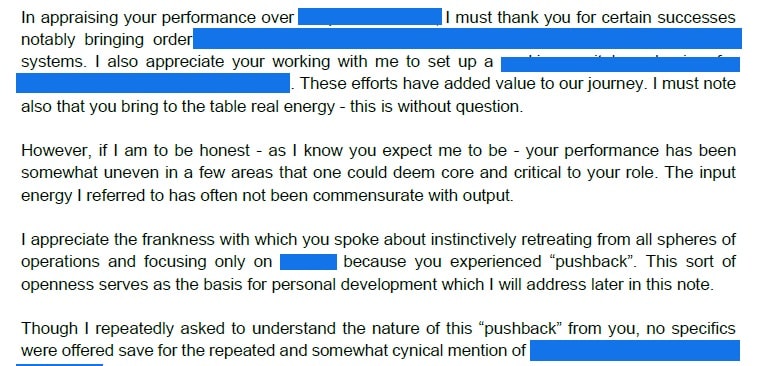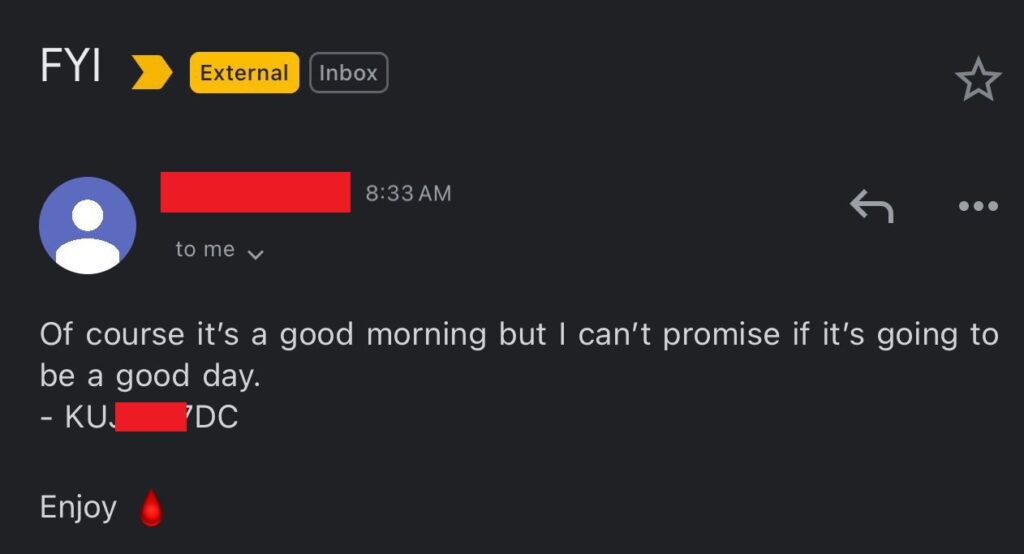In April 2024, Techpoint Africa‘s X (formerly Twitter) account started getting tagged in multiple posts from various accounts, some anonymous, discussing sudden layoffs while raising other allegations about the leadership style of Sim Shagaya, Group CEO and Founder of uLesson. This prompted us to investigate the matter.
These mentions continued every month until the beginning of June, while our investigations continued.
Our investigation began with those affected by the said layoffs but who did not directly interact with the CEO or management. It then extended to those who had worked and are currently working closely with them, in order to get a comprehensive view of the situation.
This piece takes into account some internal documents, the testimony of Shagaya, and 17 past and current employees, many of whom requested anonymity to allay their fears of victimisation.
Initial findings
“By the end of my third month, I was clinically depressed,” a top ex-employee who reported directly to Sim Shagaya told Techpoint Africa during an almost hour-long call. “I was so depressed I could hardly get out of bed. I was thinking of everything I left behind to relocate to Abuja.”
Several former uLesson employees have alleged that the edtech startup’s leadership fosters a toxic work environment marked by bullying, verbal abuse, micromanaging, discrimination, subjugation, and blindsiding
Their claims mainly focus on the founder and some close executives making the workplace unbearable for employees to thrive, especially when they question his authority.
“If you try to bring a different idea or try to sanitise the system, as long as you’re against him [Shagaya] or his actions, you’re next [to go],” one source stated.
Several other sources accused Shagaya of being toxic, berating, and using cuss words at employees, sometimes during management meetings in front of many people, and not giving leaders enough freedom to exercise their expertise despite having a rich team of highly experienced executives.
“When a leader entertains office gossip, accuses employees falsely, publicly attacks them, dismisses their opinions, and frames employees without allowing them to defend themselves, it results in undermining trust,” another source explained. “This creates a negative work environment, reduces employee engagement, limits constructive dialogue, impedes growth and innovation, and leads to retention and recruitment challenges.”
However, the founder and several current employees directly reporting to him in various leadership capacities have denied these allegations, asserting that uLesson has a supportive work culture, is a fun place to work, promotes mutual respect, and has an open-door policy where leadership is approachable.
“Being an entrepreneur anywhere in the world is challenging for many reasons, which are not only infrastructural,” Shagaya told Techpoint Africa over a call. “The most difficult thing to do is to build a team, and one of the things involved is letting people go, and people’s reactions to that vary.
“Some will understand that there are, perhaps, other opportunities for them outside, while others might decide to criticise the business. Meanwhile, we’re the people who create these jobs. I have no other incentive than to build a company for people that are performing. And to the best of my knowledge, the people I work with are happy.”
Shagaya also provided supporting documents, claiming that performance reviews at uLesson are conducted in a professional, constructive, and supportive manner.

He also mentioned cases where employees were graciously and silently disciplined despite serious misdemeanors, fostering an environment of continuous improvement and mutual respect.
With a current workforce of 300, the uLesson Group comprises both the edtech platform and the one-year-old Miva Open University.
uLesson has shown remarkable growth since its inception. Launched in 2019, just before the COVID-19 pandemic, it capitalised on the sudden need for remote learning solutions as schools worldwide closed down. The platform quickly gained traction by offering comprehensive subscription-based K-12 learning resources and exam preparation materials.
This rapid adoption was instrumental in attracting investment. In March 2020, uLesson raised $7.5 million in a Series A funding round led by Owl Ventures, with participation from LocalGlobe, Founder Collective, and TLcom Capital. By December 2021, the startup had secured a $15 million Series B investment from Nielsen Ventures and Tencent, alongside the initial investors.
The company launched Miva Open University in 2023. Miva University, a privately-owned tertiary institution, offers undergraduate and MBA programmes. Miva’s swift accreditation and the enrollment of its first batch of students within a year underscore its success. The university has since introduced courses in nursing and continues to grow its student base.
Meanwhile, earlier this year, uLesson diversified its offerings with the introduction of Classboard, a product targeting schools and state governments. According to internal sources, the uLesson group only just became cash flow positive this year since inception.

Overall, uLesson’s trajectory is quite impressive in its attempt to place itself at the forefront of edtech in Nigeria. This growth narrative, however, is set against the backdrop of recurring allegations of workplace toxicity, which the company continues to address.
Subjugation and verbal abuse claims
Some sources accused the founder of a targeted vendetta against leaders who stand up to him, stating that when they can’t be explicitly let go, they are frustrated out of the job.
This was, however, refuted by an executive who has been with the company for over two years.
“I haven’t experienced any bullying or yelling in all my years of working here. Hard conversations are necessary, so people being held accountable for their actions shouldn’t be termed toxic.”
Oladipo Olugbemi, Group VP of People, added that he hasn’t noticed any instances of the Group CEO berating staff since joining the company in December 2023. Similar reports were given by other executives who have worked directly with Shagaya for periods ranging from six months to three years.
On the contrary, another source recounted two instances where they were embarrassed during meetings attended by both internal representatives and investors for a miscommunication stemming from management. They further accused Olugbemi of allowing the founder to interfere in HR decisions.
Denying this, Olugbemi maintains that Shagaya gives every leader the independence to make decisions.
“In meetings, he doesn’t speak first, that is if he even attends at all.”
Recall, this is not the first time allegations of toxic leadership have been raised against Shagaya. The first was following the #HorribleBoss trend in 2022, which led the founder to limit interaction with the business.
In October 2023, the founder announced his intention to step down from his role as CEO (via a now unavailable tweet from a currently inactive X account) to become the Group CEO, focusing on Miva Open University as chancellor. Ex Chief of Staff, Nihinlola Ayooluwa took up the role of uLesson CEO.
This is familiar for Sim Shagaya, who in 2016 resigned as Konga’s CEO to become the chairman of the company’s board of directors after running day-to-day operations for four years.
Some sources mentioned that several employees considered taking legal action against the company due to workplace toxicity, but it resulted in out-of-court settlements. However, these claims are unsubstantiated.
One executive noted that the only case that made it to court involved a team head who was dismissed on account of alleged inappropriate conduct towards a team member who reported to the HR.
However, one source close to this matter claims that the individual in question was not given a chance to present their case to a disciplinary committee before a verdict was made, depriving them of a fair hearing.
“The issue of the disciplinary committee is a bogus event,” they added.
Boundaries, work-life balance, and mental health
Three former employees said they sought mental health assistance after leaving the company; one said they came to work apprehensive, not knowing if it would be their last because the company was laying off at the time. Others accused the founder of setting unrealistic expectations, which made them resort to extreme measures to meet targets.
In response, the Registrar of Miva Open University, Iheanyi Akwitti, corrects the notion of what’s termed unrealistic.
“There’s nothing wrong with holding team members to higher standards, which has helped the university achieve significant milestones in under a year.”
Despite these achievements, another source who worked in an executive position close to Shagaya reported that the founder showed no boundaries in communication, with work-related messages sent after office hours and immediate responses expected.
One former employee mentioned enduring the constant use of offensive language for three years — particularly from three top executives — ultimately leading to their resignation.
Another claimed that the closer someone got to the founder, the more depressed they became.
“Those not in senior positions could survive in the company for long, but getting promoted seemed to signal impending termination or forced resignation. Reporting to HR was not considered an option because they all worked together,” they explained.
Another former employee who described the atmosphere as “hell” said they were constantly worried about losing their job for any minor infraction or disagreement with leadership.
Shagaya denies these allegations, describing the company as a positive workplace where abuse and harassment are not tolerated, and where complaints to HR are taken seriously.
Layoffs and suspicious resignations
LinkedIn data reveals that uLesson has 471 past and present employees associated with it on the platform.
An Intelpoint analysis sampled 287 ex-employees, excluding contract and internship roles, and revealed that 103 employees (35.8%) spend between one and two years at the organisation, which aligns with the globally recognised average job tenure today.

Meanwhile, among these former employees, the analysis also identified 28 executives — including SVPs, VPs, heads of department, C-Suite executives, general managers, and senior roles — who joined between 2021 and 2023 and found that the average duration of stay for these leaders was just 12 months.
This relatively short tenure among senior leadership could indicate a challenge in retaining top talent, suggesting a trend of high employee turnover, particularly for those who ascend the ranks. However, it could also reflect the broader trend of global talent mobility, where top executives frequently move between companies and locations in pursuit of new opportunities and challenges.
While the company claims not to have an attrition problem, it has undergone minor and major restructuring between 2023 and Q1 2024, leading to the layoff of 100 employees.
The latest restructuring, which affected the telesales team and parts of the customer service, product, and content teams, was not well received by those affected.
As explained by Olugbemi, the telesales team, set up in 2021, was responsible for converting leads for uLesson tablet sales.
While Shagaya states underperformance as reason for the mass layoff, a source involved in facilitating the layoffs said the redundancy caused by economic conditions affecting tablet importation and prices made the team question the viability of the product.
The company then made the difficult decision to stop tablet sales to focus on Classboard, a product targeting high-spending customers. About 90% of the telesales team was let go, leaving only a few to sell Classboard to schools and state governments.
In response to complaints about the sudden layoffs, the Group VP of People explained that the company did not breach any employment contract clauses, paying two months’ severance in lieu of the one-month notice required.
Despite reports of departmental head and executive resignations in Q1 2024, the company does not consider it a worrying attrition rate, stating it isn’t losing critical personnel.
Olugbemi said he has only witnessed one exit since his arrival in December, which was voluntary; this is in contrast with the four discovered through Intelpoint‘s analysis.
However, another source claimed the company sometimes convinces employees not to leave when they get other offers, only to let them go months later. A specific case mentioned included the head of product who was allegedly let go a few months to her maternity leave, but this could not be confirmed.
A previous Group HR hire in Q3 2023 also left within weeks, allegedly due to the toxic environment, though the company cited location issues and culture fit.
Shagaya, however, addresses the reasons behind employee departures.
“There are several reasons people may leave a company including having found what they believe to be better-suited opportunities elsewhere, or performance reasons. And performance could be purely technical, cultural, or ethical.
“In fact, some of the people we’ve had to part ways with have found reasons to issue threats to me and some of my colleagues. And while I know that the economic situation in the country is hard, it does not provide justification for people to threaten others.”

Misappropriation of funds?
A source close to the matter mentioned that the company was at a stage where it needed to reduce operational expenses. One noticeable trend was how much went into hiring. Another source alleged that the founder diverts company funds for personal expenses.
This was largely denied by Shagaya who adds that he invested a good chunk of the money he made from the Konga acquisition in uLesson.
Meanwhile, in his defense, a current employee noted that the company has an Expense Approval Committee that the founder is not part of, suggesting that he doesn’t have much influence on company spending.
The allegations against uLesson’s leadership and its founder, along with their corresponding defense, are based on the testimonies of various sources and have not been independently verified by Techpoint Africa. Addressing these issues transparently and constructively will be crucial for uLesson to sustain its growth and maintain its reputation in the African tech space.
This is a developing story.











